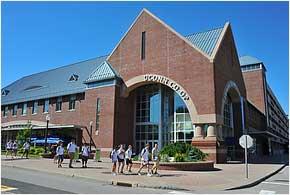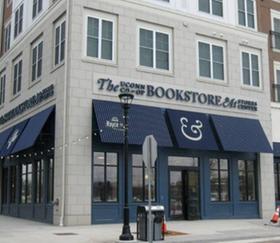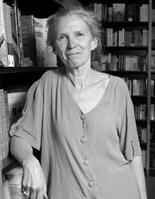Sad news about the UConn Co-op: the store, which has 10 locations in Storrs and on other University of Connecticut campuses, will be taken over by Barnes & Noble or Follett later this year. A UConn attorney sent a letter to Timothy Dzurilla, chair of the Co-op's board of directors, saying that after 40 years of service to the school, the Co-op is out of the running for future operation of the bookstores. The school is expected to make a decision by March 31, and the new operator may take over as soon as June. Quoted by the Daily Campus, the attorney, Patrick Nevins, said that the major budget cuts faced by UConn in recent years were a factor, since Barnes & Noble and Follett have promised "millions of dollars in increased revenue to the university each year. The university has made the decision to direct the entirety of this new revenue to financial aid and student support--which is under considerable strain in an era of increasingly scarce resources."
Quoted by the Daily Campus, the attorney, Patrick Nevins, said that the major budget cuts faced by UConn in recent years were a factor, since Barnes & Noble and Follett have promised "millions of dollars in increased revenue to the university each year. The university has made the decision to direct the entirety of this new revenue to financial aid and student support--which is under considerable strain in an era of increasingly scarce resources."
Nevins added that both national companies have "a stellar record of providing high-quality services in campus" and "offer affordable programs in textbook rentals and price-matching."
Nevins also questioned the proposals the Co-op made during the bidding process, saying that the Co-op has "limited resources to achieve this ambitious transformation and has a history of unfulfilled promises.... On the whole, the Co-op's contention that it could reverse years of decline virtually overnight while making significant new investments and creating costly new programs does not appear to be realistic."

|
|
| The UConn Co-op Bookstore at Storrs Center in downtown Storrs, Conn., opened in 2014. | |
Co-op president Bill Simpson told the Daily Campus, "We feel we were the best choice for the students and that we put the students first in our bid proposal.... One of the things they said that was against us was that our bid was not as financially enumerating as were the other bids. That's because we didn't give all of our money to the university. We gave a portion of it to the students. We feel that since students pay for the vast majority of what happens at the bookstore that students ought to benefit from it as well, but that's apparently not the way the university is dealing with it."
"This is a real cornerstone of UConn's identity," board chair Dzurilla commented to the Hartford Courant. "It would be like replacing the [UConn] Dairy Bar with Baskin-Robbins. You'll still be able to get ice cream, but sometimes you want more than that."
The outsourcing process apparently started early last year when the Co-op asked for help from the administration because of some financial problems and had hoped that its employees could become UConn employees. Although the Co-op began a turnaround, the administration took the situation as a reason for outsourcing the store.
In the months since the University announced late last year that it would open bidding for running the store, the store and its many supporters among students, faculty, alumni and the general community have rallied. More than 6,000 people signed an online petition in support of the Co-op, and another 7,000 signed paper petitions. Aa huge crowd rallied on campus on February 8, when the Co-op made its case to continue operating the Co-op.
 |
|
| Suzy Staubach | |
Suzy Staubach, who retired last year as manager of the Co-op's general books division, wrote that she was "heartbroken and dismayed" by the university's decision but "filled with gratitude and wonder" at the supporters of the Co-op. Besides the petition signers, that group included "the huge number of authors and illustrators who wrote in support--Caragh O'Brien, Wendell Minor, Barbara McClintock, Gary Amdahl, Leslie Brody and others; the publishers and industry professionals who wrote in support including Oren Teicher and Steve Fischer, executive directors of the American Booksellers Association and the New England Independent Booksellers Association respectively; faculty like Ron Mallett who spoke on the Co-op's behalf and Robert Thorson who devoted his column to the Co-op; the faculty band Blues Without Borders who played in support of the Co-op and the huge crowd who came out to cheer; all the people who have spoken out and worked hard, especially alum and bestselling author Wally Lamb, and faculty Harry Frank and Greg Anderson; Tom King of Neighbors who let us tell the Co-op's story; other members of the UConn community who wrote such as BIMP director John Bell; all the community members, readers and artists and parents, who lent support; local teachers and faculty from other colleges such as Denise Abercrombie and Jon Anderson; the state legislators and representatives including Rep. Greg Haddad, Senator Mae Flexer and others; students, yes, students who took the time to write; and poet Martín Espada whose upcoming reading is dedicated to the Co-op; fellow independent booksellers from around the country who sent words of encouragement; sports fans, some uttering harsh expressions of anger or disbelief during their pregame shopping excursions when learning of UConn's plans--so much support I cannot begin to list it all here. And then there is the Co-op's indefatigable, hardworking young Board of Directors, led by grad student Tim Dzurilla who have spent hours and huge amounts of energy and thought, working to save the Co-op. And the Ambassadors who have worked so hard. And the staff, who have endured the uncertainty of it all, carrying on with events and textbook RUSH as if everything is normal, while competing bidders walked around the bookstores with clipboards and tape measures, laying their own plans."
The UConn Co-op is an independent, member-owned, nonprofit cooperative that was founded in 1975 after a task force of faculty and students appointed by the university president at the time decided that a co-op was the best way to serve students--and replace the chain store that had operated for a short while. (Ironically, that store was Follett, one of the possible new bookstore managers.)

